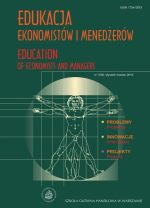Treść głównego artykułu
Abstrakt
This paper specifies competences and skills of methodologically rational decision making and their impact on security of organisations. The study indicates some reasons for developing the competencies and skills in education, professional development and taking them into account in the recruitment. It is the practical aim of this paper. Its scientific aim is to formulate and to partly justify general hypotheses concerning the impact of methodologically rational and irrational attitudes of members of organisations on their security. We apply the method of ideal types of Max Weber and phenomenological analyses, which concern intentionality of methodologically rational and irrational mental attitudes.
Słowa kluczowe
Szczegóły artykułu
Autor (Autorzy) artykułu oświadcza, że przesłane opracowanie nie narusza praw autorskich osób trzecich. Wyraża zgodę na poddanie artykułu procedurze recenzji oraz dokonanie zmian redakcyjnych. Przenosi nieodpłatnie na Oficynę Wydawniczą SGH autorskie prawa majątkowe do utworu na polach eksploatacji wymienionych w art. 50 Ustawy z dnia 4 lutego 1994 r. o prawie autorskim i prawach pokrewnych – pod warunkiem, że praca została zaakceptowana do publikacji i opublikowana.
Oficyna Wydawnicza SGH posiada autorskie prawa majątkowe do wszystkich treści czasopisma. Zamieszczenie tekstu artykuły w repozytorium, na stronie domowej autora lub na innej stronie jest dozwolone o ile nie wiąże się z pozyskiwaniem korzyści majątkowych, a tekst wyposażony będzie w informacje źródłowe (w tym również tytuł, rok, numer i adres internetowy czasopisma).
Osoby zainteresowane komercyjnym wykorzystaniem zawartości czasopisma proszone są o kontakt z Redakcją.
![]()
Referencje
-
1. Abell, P. (1991). Rational Choice Theory. Hants, Brookfield: Edward Elgar PublishingLtd.
2. Alberti, R.E., & Emmons, M.L. (2001). Your Perfect Right: Assertiveness and Equality inYour Life and Relationships (9. issue.). Atascadero, Calif.: Impact Publishers.
3. Arbib, M.A., Érdi, P., Szentagothai, J. (1998). Neural Organization: Structure, Function,and Dynamics. Cambridge, Massachusetts, London: MIT Press.
4. Aronson, E., Wilson, T.D., Akert, R.M. (1997). Postawy i zmiany postaw: wpływanie namyśli u uczucia. Spostrzeganie społeczne: jak dochodzimy do rozumienia innychludzi. W: Psychologia społeczna. Serce i umysł. Poznań: Zysk i S‑ka, 309–353.
5. Bicchieri, C. (1997). Rationality and Coordination. Cambridge, New York, Melbourne:Cambridge University Press.
6. Bickmore, K. (2003). Conflict Resolution Education. In: W.J. Pammer, J. Killian (Eds.),Handbook of Conflict Management. New York, Basel: CRC Press, 3–31.
7. Bocheński, J.M. (1987). Sto zabobonów: krótki filozoficzny słownik zabobonów. Paryż:Instytut Literacki.
8. Bocheński, J.M. (1993). Logika i filozofia. Wybór pism. Warszawa: WydawnictwoNaukowe PWN.
9. Bortolotti, L. (2010). Delusions and Other Irrational Beliefs. Oxford, New York: OUPOxford.
Referencje
2. Alberti, R.E., & Emmons, M.L. (2001). Your Perfect Right: Assertiveness and Equality inYour Life and Relationships (9. issue.). Atascadero, Calif.: Impact Publishers.
3. Arbib, M.A., Érdi, P., Szentagothai, J. (1998). Neural Organization: Structure, Function,and Dynamics. Cambridge, Massachusetts, London: MIT Press.
4. Aronson, E., Wilson, T.D., Akert, R.M. (1997). Postawy i zmiany postaw: wpływanie namyśli u uczucia. Spostrzeganie społeczne: jak dochodzimy do rozumienia innychludzi. W: Psychologia społeczna. Serce i umysł. Poznań: Zysk i S‑ka, 309–353.
5. Bicchieri, C. (1997). Rationality and Coordination. Cambridge, New York, Melbourne:Cambridge University Press.
6. Bickmore, K. (2003). Conflict Resolution Education. In: W.J. Pammer, J. Killian (Eds.),Handbook of Conflict Management. New York, Basel: CRC Press, 3–31.
7. Bocheński, J.M. (1987). Sto zabobonów: krótki filozoficzny słownik zabobonów. Paryż:Instytut Literacki.
8. Bocheński, J.M. (1993). Logika i filozofia. Wybór pism. Warszawa: WydawnictwoNaukowe PWN.
9. Bortolotti, L. (2010). Delusions and Other Irrational Beliefs. Oxford, New York: OUPOxford.
